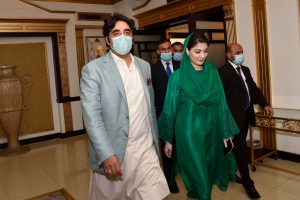By Munir Ahmed

Pakistan’s ailing former Prime Minister Nawaz Sharif broke a nearly yearlong silence from exile in London to vow to oust Imran Khan from office, accusing him of only reaching power through a vote rigged by the country’s powerful military.
The 70-year-old former premier offered an emotional, direct attack late Sunday on Khan and the military, with which he has a long, uneasy relationship. Khan’s government on Monday dismissed his remarks, with Information Minister Shibli Faraz saying the Pakistani opposition is only united because they fear ongoing corruption cases targeting them.
Sharif thrice served as Pakistan’s prime minister, first removed by a president in 1993, then by military ruler Pervez Musharraf in 1999. A court in 2017 ousted him from power over corruption allegations. Khan, a former cricketer, came to power in 2018.
“Our struggle is not just against Imran Khan,” Sharif told an opposition rally in Islamabad via videoconference. “Our struggle is against those who installed Imran Khan and who manipulated the vote to bring an incompetent man like him to power and thus destroyed the country.”
Sharif spoke from London, where he has been since last November when he was released on bail to seek medical treatment abroad. At the time, a court permitted Sharif to leave the country for four weeks, but he did not return. A court last week issued arrest warrants for Sharif, previously sentenced to seven years in prison on corruption and money laundering charges stemming from disclosures in the Panama Papers.
On Sunday, Pakistan’s opposition parties held a meeting that was attended by “JUI-F chief Maulana Fazlur Rehman… PML-N president Shahbaz Sharif and vice president Maryam Nawaz, PPP chairman Bilawal Bhutto-Zardari and other prominent opposition leaders,” according to Pakistani daily Dawn.
At the meeting, the opposition parties cemented their alliance through the announcement of a new coalition, the Pakistan Democratic Movement. Their grievances with the current government range from allegations of rigged elections to criticism of “failed policies” on the economy, rising sectarianism, and targeting of judges and journalists with lawsuits. The opposition agreed to hold nationwide rallies in October to pressure Khan to resign. Sharif was targeted by similar mass protests during his rule.
Pakistan’s military has ruled the country of 220 million people — directly or indirectly — for most of its history. Successive attempts at protracted democracy have been interrupted by military coups, the last one in 1999.
Pakistanis went to the polls in 2008 and elected their first civilian government in 12 years. But critics allege that the military still plays the role of kingmaker, helping ensure the election of favored politicians. Accusations that his election was engineered by the military have dogged Khan since he assumed office.
No comments:
Post a Comment